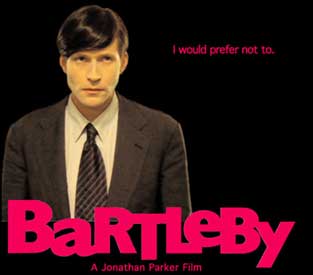"So that Turkey's paroxysms only coming on about twelve o'clock, I never had to do with their eccentricities at one time. Their fits relieved each other like guards" ("Bartleby the Scrivener," 13).
Question Thirteen asks about humor, so let's talk about the humor.
I found this story a bit tedious but genuinely funny. The images of certain characters was extremely humorous to me -- it took a while for me to recover after the "guards" simile. What it does is characterizes Turkey and Nippers in a very engaging way; it also creates some sympathy for the narrator, who has to deal with exactly one ill-tempered person at a time. The little repetitive phrases like "with submission, sir" (Turkey, various moments) also served as what I thought were funny characterization methods. There are other instances like this, but let's turn to Bartleby.
There's a strong contrast between the narrator and Bartleby when the narrator asks for something to be done. For example, when the narrator first explained that Bartleby needed to help examine the copies, he did so "hurriedly" with little patience (30). Bartleby, on the other hand, always maintained composure, no matter how weird he was. There are very ironic moments where the narrator will describe how intensely hardworking Bartleby is, and then Bartleby will inconsistently be of no assistance to the narrator.
Then again, I couldn't stop laughing when I was reading the poem "Edward," so I probably have little right to speak on the subject of humor.
Showing posts with label Melville. Show all posts
Showing posts with label Melville. Show all posts
Wednesday, November 16, 2011
I would prefer not to analyze this story.
"The report was this: that Bartleby had been a subordinate clerk in the Dead Letter Office at Washington, from which he had been suddenly removed by a change in the administration. When I think over this rumor, I cannot adequately express the emotions which seize me. Dead letters! does it not sound like dead men?" ("Bartleby the Scrivener," 250).
Question Eight asks about Bartleby's motivation behind his behavior, Melville's motivation behind his withholding this piece of information, and the extent to which this information adequately explains Bartleby. So I'm going to answer about it!
The narrator suggests that if Bartleby were already pallidly hopeless, working in the Dead Letter Office would make him even more hopeless. If this rumor is true, which is all I can assume, then Bartleby spent a great deal of time sorting dead letters for destruction -- letters, bank notes, rings never to be delivered. Bartleby's "I would prefer not to" attitude may not be annoying as much as it is hopeless. If I lacked hope to the extent that Bartleby did, I would have trouble working as a copyist, too -- perhaps not to Bartleby's extent, but characters have to be exaggerated.
So why does Melville hold off this last piece of information? I think that Melville wants us to detest Bartleby during the story. How annoying is it that he refuses to be of any additional help to the narrator? How creepy is it that he stays in the office for abnormal amounts of time and refuses to leave even when the office is gone? Then, once we have this crucial piece of information, we might (reluctantly) develop a feeling of pity for Bartleby. It's kind of like a guilt trip, I think. We spend the entire three hours we read the story being put off by Bartleby's words and actions when we fail to consider what traumatic past he may have endured. Bartleby may seem flat on the surface but is very round on the inside. I'm not calling him fat.
This is kind of morphing into a bland theme of "don't judge someone because you don't know what his situation is." Melville says it better. Albeit much longer.
Question Eight asks about Bartleby's motivation behind his behavior, Melville's motivation behind his withholding this piece of information, and the extent to which this information adequately explains Bartleby. So I'm going to answer about it!
The narrator suggests that if Bartleby were already pallidly hopeless, working in the Dead Letter Office would make him even more hopeless. If this rumor is true, which is all I can assume, then Bartleby spent a great deal of time sorting dead letters for destruction -- letters, bank notes, rings never to be delivered. Bartleby's "I would prefer not to" attitude may not be annoying as much as it is hopeless. If I lacked hope to the extent that Bartleby did, I would have trouble working as a copyist, too -- perhaps not to Bartleby's extent, but characters have to be exaggerated.
So why does Melville hold off this last piece of information? I think that Melville wants us to detest Bartleby during the story. How annoying is it that he refuses to be of any additional help to the narrator? How creepy is it that he stays in the office for abnormal amounts of time and refuses to leave even when the office is gone? Then, once we have this crucial piece of information, we might (reluctantly) develop a feeling of pity for Bartleby. It's kind of like a guilt trip, I think. We spend the entire three hours we read the story being put off by Bartleby's words and actions when we fail to consider what traumatic past he may have endured. Bartleby may seem flat on the surface but is very round on the inside. I'm not calling him fat.
This is kind of morphing into a bland theme of "don't judge someone because you don't know what his situation is." Melville says it better. Albeit much longer.
Subscribe to:
Posts (Atom)
